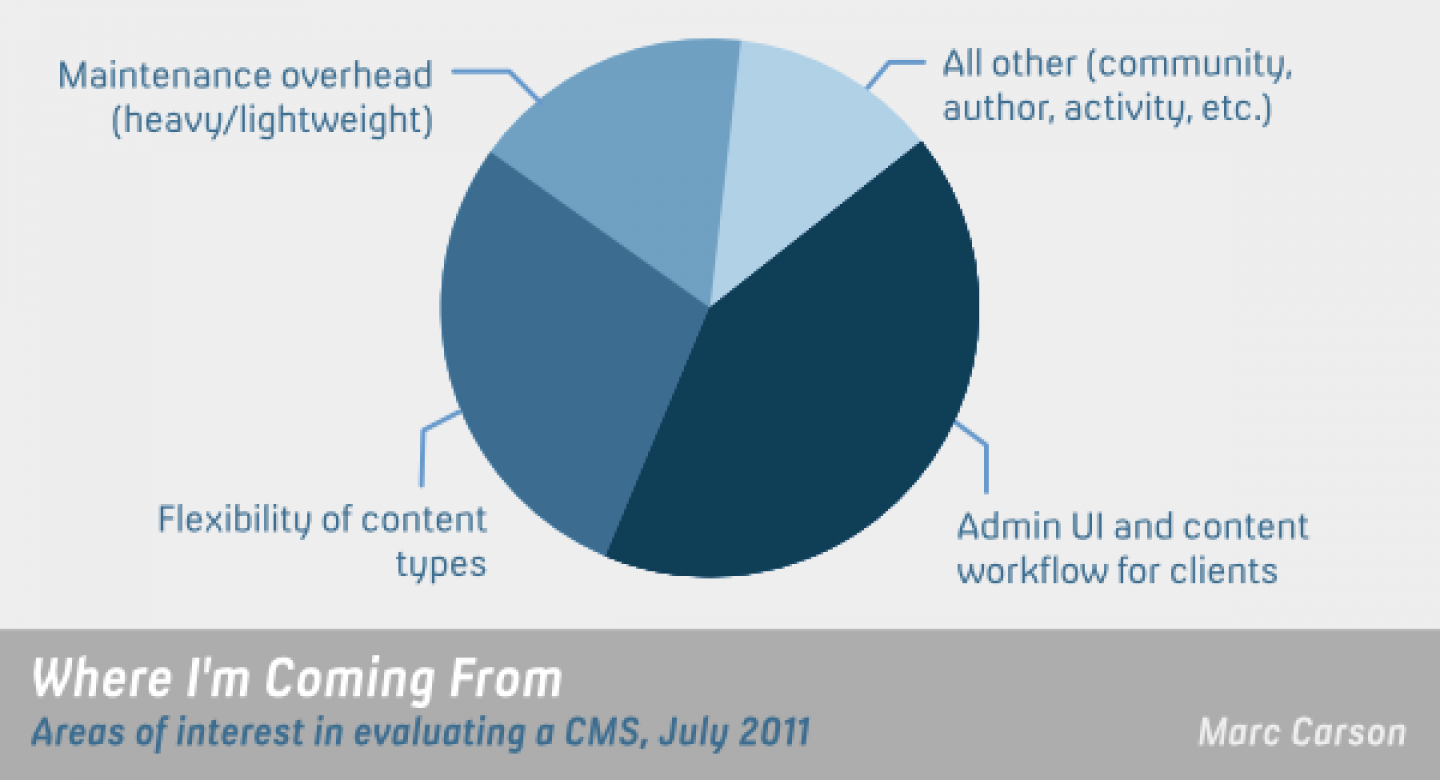From my Notebook >
Thoughts on CMS Packages, July 2011

In my day job I work with different CMS (Content Management System) packages all the time. I really enjoy working with content and data, so I all-caps LOVE exploring different CMS packages.
To put this article in context, you can see where my interests are in CMS selection—take a look at the graph above. Here are the different packages floating around in my brain right now:
Textpattern
Current all-around hero. Like (probably) most TXP-using designers and developers, I’m using a far-from-stock configuration. To many newcomers, TXP may be a pseudocode-based CMS, but it’s all PHP behind the scenes and allows you to use PHP just about anywhere, so people who are developing with it every day use PHP quite often, taking advantage of the many TXP plugins and its extreme flexibility.
Textpattern gets a lot of “whatever happened to Textpattern” comments on the web lately, since it was a pretty big deal when it launched back in 2005 or so. The fact is, there was a dip in activity a couple of years ago and after working through it, TXP is in something of a renaissance, with frequent releases headed toward version 5. Excitement fills the air, and there’s plenty of it left to breathe after a segment of the userbase departed for Wordpress, Symphony, Drupal, and MODx before this all came to pass.
Textpattern gets knocked about quite a bit for being limited in scope, but as any designer knows, scope limitations are where creativity begins. It may have a limited semantic model, but that’s no reason to shrug off a CMS.
TXP 5 is being developed on top of a new PHP framework called Spark/Plug, a one-file framework created by Sam Weiss, the developer of Escher CMS. And he’s a TXP developer. Busy guy, I guess.
Processwire
If you have any interest in CMS software, check this one out.
Processwire is on track to become a sort of sleeper hit of a CMS. It was created by Ryan Cramer, who I oddly enough remember from my youth. He used to run a BBS back in the 80s called “Data Connection.” Which of course you would dial up while your sister was catching the latest episode of “Love Connection.” Combine Ryan’s tech savvy with the design sense he appears to have honed by being around his family of designers, and you’ve got a powerfully abstract, sexy little CMS that gives you gorgeous API to work with. Even if you’re learning PHP this one is a great idea to pick up and play.
Also if you’re reading this Ryan I think you need to release some music. It’s been how long now?
Decisions
I currently choose between Textpattern and Processwire by looking at the following:
- How badly does the client need access to an interactive tree of site pages for rearranging items and managing from a bird’s eye view? Really bad? Then Processwire.
- Have I done this sort of thing before? If so, in which CMS?
- How much computing prowess does the client have? In my demo sessions, TXP with tons of stuff ripped out of the admin panel’s front end does very well with low-tech types. Processwire’s tree has a steeper learning curve for these types, so they might prefer to exchange interactivity for fewer actions to fiddle with. Drag-and-drop reordering has been one of the great disappointments of CMS admin front-ends, in my opinion. It’s like a usability cliff.
- Does the site demand extremely customized page-content types? If a superficial approach is out, then so is TXP, generally (but there’s a lot to say for the superficial approach, in my experience). Processwire can pull new content types out of thin air, and that’s without spending hours on overrides like the big boys make you do.
Anyway, those are the top factors that come to mind. And speaking of big boys:
Joomla
Oh man do I have a lot of experience with Joomla. But after a while I just wasn’t willing to dogfood it. And I found that I would only use it when clients’ projects fit the software to a T. So now many of my clients who use it are talking to me about moving to something simpler, or more custom, or faster, etc.
When I work on Joomla sites now, I customize so much that I feel like I might as well be writing my own CMS.
Drupal
Terrific software. Just not willing to dogfood it; maybe I’m tapped out on enterprise CMSes. Maybe it’s a tad heavy-duty or override-y for my taste. It’s really powerful and the community around it is very productive.
I see people using Drupal because it has everything. I used to love CMSes that had everything. But nowadays I am focused on removing things, and most of what I remove is in the admin workflow. I’d be interested to read about any custom Drupal admin UIs and how much maintenance they require from version to version.
Like many, I may not love Drupal, but I love that it’s there.
MODx
Great package, really enjoyed using Evo, but I haven’t spent as much time with it since Revo came out. Quite a bit of interesting pseudocode in there. Still, it’s all PHP so it’s not like it’s a pain to work with. I just don’t see my clients enjoying the admin UI compared to other clients using other software.
Wordpress
Stopped working with it some time ago. I suppose I still could, but it’s sort of a stationary target with lots of strange products built around it. The whole Wordpress ecosystem baffles me in some ways and fascinates me in others. I see a lot of Joomla-style push and pull around the commercial roots of all the “free” resources available.
Keep in mind though, that when I brush off Wordpress, I’m not saying it’s bad software. Most who use it are wearing a completely different hat, and probably have valid reasons for using it.
And one little boy:
Stacey
A great flat-file CMS with no admin panel. Really nice for just relaxing at the command line and using all the fun tools there. Or maybe you’re sick of databases. Or maybe you love Markdown and are one of those designers-who-code types. TONS of those guys and gals love Stacey. They all own exactly one pair of jeans at a time and own a single #2 pencil, but they can draw, paint, photograph, and play guitar like angels. Yeah those guys (kidding!).
Proprietary CMS
Webvanta
The only proprietary CMS I’ve spent much time with so far, after doing eyeball comparisons with many others. Great looking interface, love how they’ve conquered custom item types, and prefer it to Wordpress’ approach. They love pseudocode and that’s fine with me. Support is great. White-labeling features don’t go as far as I’d like. Not PHP in the back, and can’t just arbitrarily rip it open. The first one, I completely understand. The second is a bit scary to consider at first.
And then there’s this: If you’re a web designer, why would you risk white-labeling a service that offers to compete with you? Just curious. Needs more thought and I’ll revisit it later.
Comments? I’m @circular on Twitter.

 Friendlyskies.net
Friendlyskies.net